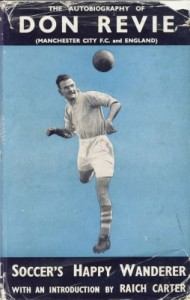 Danny Blanchflower once said “The great fallacy is that the game is first and last about winning. It’s nothing of the kind. The game is about glory. It’s about doing things with style, with a flourish, about going out and beating the other lot, not waiting for them to die of boredom”
Danny Blanchflower once said “The great fallacy is that the game is first and last about winning. It’s nothing of the kind. The game is about glory. It’s about doing things with style, with a flourish, about going out and beating the other lot, not waiting for them to die of boredom”
I had never seen this quote before Stephen Foster brought it to my attention in this book, and I am grateful to him for it. If anything encapsulates my view of the beautiful game then this is it. As Foster opines, if anything was the complete opposite of Tony Pulis’ approach to the game, this quote would be equally perfect. Here lies the quandary, here lies the paradox. How can a supporter of Stoke City dislike a manager so intently when he has just delivered the incredible – a return to the top flight of English football for the first time in 25 years, a feat which seemed less likely to many than finding the lost city of Atlantis? Indeed as a long suffering Stoke supporter of 22 years I have witnessed the worst era in the club’s history, dark days, and storylines so ludicrous a fiction writer would be hard pressed to make up, dismissed by his public as too unrealistic. But amazingly here we are about to face the most exciting season in 25 years, a season in the Premiership, the high point so far so in many supporters’ lives. Am I excited? Oddly not really, and Foster’s book goes a long way to explain why.
Several years ago I read Foster’s excellent “She Stood There Laughing: A Man, His Son and Their Football Club”, an account of Stoke City’s first season back in the Championship. Hard to put down I moved through the book at pace marvelling at the quality of poetic language used to describe so many bleak events. There was much laughter too; Foster’s observations are sharp, witty, and frankly accurate. This hilarious autopsy of Pulis’ first season saw me nodding my head in agreement and wishing I had the talent to express my near identical views in this way. In short it was spot on.
So it was with eager anticipation that I awaited “And She Laughed No More”. In the intervening years I had met the author, attended the weekend in Brussels recounted in the book, and was a regular recipient of the call to arms – the “Pulis out” text message. If anything this book is better than his previous account of the Stoke experience. It deals with the contrasting emotions of revulsion towards all that is wrong with the Premiership – greed, money, high ticket prices, prima donna footballers, silly transfer fees, and sycophantic media – and the opposite side of the coin, the joy of being there, the experience of competing against the best and not coming up short too often. His accounts of matches I attended capture the moment so wonderfully, be it on the pitch or general atmosphere, that I trust the descriptions of games I could not make in person. Indeed these are often the most enlightening, for Foster sums up so well, I might honestly think I’d been there. Again the author’s analytical nature and self-deprecating wit shine through the inebriated haze of the average supporter to deliver an entertaining and honest account of Stoke City’s first Premiership season. His inclusion of family and friends who endured the season with him adds colour and depth to the account. There is the human story as well as the football story. It would be enjoyed by football fans and Stoke fans alike.
The sub plot to the book is the relationship of the author with the manager Tony Pulis. Considered a dour, negative, cautious individual who has played for “respectable” 0-1 defeats in his time, one might expect that Pulis would be both out of his depth at this level and his dull brand of football could only be the complete opposite of what’s required to remain in the Premiership. Many of us thought so, including the author, and I definitely did! As if in a state of disbelief and denial, I still do, wondering how such an average manager with such a limited set of tactics and almost at times a contemptuous disdain for football could manage such a remarkable achievement. This book elaborates how. Foster set out to chronicle the Premiership adventure not knowing where it might lead, suspecting an instant return to the Championship like many more of us. However in the course of the season he describes the sometimes dire, sometimes lucky, and sometimes heroic way that a team of largely average footballers come together as a galvanised determined unit for their gaffer, and keep him and the club in the Premiership. The infuriating tendency to sit deep away from home and invite defeat was an insult to the hardy travelling supporters and for likes of Foster and myself, exiles living many miles from Stoke-on-Trent, the home matches were like going away too. But here the experience was different. Not always pretty, rarely in my view entertaining, the Britannia experience was a passionate one, and the willingness to compete and clinch hard working results proved enough for the majority of the fans. Foster captures this feeling within this book superbly, and it is this match day experience that sees his attitude to Pulis change. While I found Pulis’ negative style increasingly depressing, and had seen enough of it over the manager’s too long tenure to consider it predictable and less deserving of my time, Foster sees the unexpected competitiveness of the underdog team as unpredictable and increasingly engaging. Slowly Pulis earns his respect, and while there are deserved criticisms and cynicism along the way, Foster finds numbering the Premiership managers he’d actually swap for Pulis as very few. Football is about being there cheering on your side, the glory and flourish as Blanchflower said. Apart from Aston Villa and Arsenal at home there seemed little glory and flourish for me throughout the majority of the season, which resulted in my absence towards the tail end. It is a credit to Foster that his accounts of matches in the latter stages of season actually make me regret my decision to avoid them.
This book is a must for Stoke fans, whether Pulis is too your liking or not. Both can savour the fine and amusing account of Stoke’s first Premiership season, a tale of the unexpected, a memento of the roller coaster ride that led to unlikely survival. Both can perhaps re-evaluate their positions, a new grudging respect for the manager by the anti-Pulis camp, while his ardent fans might acquire an understanding and acceptance of justified criticism towards him. Those looking in from outside can enjoy a humorous and true depiction of Stoke City’s season far removed from the clichéd media and their lazy journalism. They might portray Stoke and supporting the club as simple and easy to summarise, but Foster demonstrates it is far more complex than that: the games, the heartbreak, the boredom, the frustration, the excitement, and the joy of supporting your team are skilfully detailed in this book. It is a story that any supporter could relate to. A story enhanced by the unlikely outcome.
What I’ve seen and listened to when Stoke play has not altered my view of Pulis, the frustrations remain, the pleasures are not derived from his methodology but solely the result. When Tuncay signed there was some excitement at his coming to Stoke and it no doubt augmented further the ‘Pulis love” felt by the author, who described the Turkish international in the book as the second best player to grace the Britannia pitch that season. I might not fully agree with Foster’s change of heart towards the manager, but I heartily recommend this enjoyable and well written book. I would have given the book ten out of ten, if it wasn’t for Foster’s surprise admiration of BBC Radio Stoke’s John Acres, a man whose standing with me runs close to Pulis, and the author’s treacherous desertion from the anti-Pulis appreciation of the beautiful game in favour of graft, mediocrity, and single digit score lines – I’m still with Danny Blanchflower, but get yourself a copy any road.
Book details
And She Laughed No More: Stoke City’s (first) Premiership Adventure
Stephen Foster
ISBN 9781906021627
Short Books Limited
Review by Andrew Pointon
 Danny Blanchflower once said “The great fallacy is that the game is first and last about winning. It’s nothing of the kind. The game is about glory. It’s about doing things with style, with a flourish, about going out and beating the other lot, not waiting for them to die of boredom”
Danny Blanchflower once said “The great fallacy is that the game is first and last about winning. It’s nothing of the kind. The game is about glory. It’s about doing things with style, with a flourish, about going out and beating the other lot, not waiting for them to die of boredom” This book isn’t as one might expect written at the end of his playing days, but in 1955 during his spell at Maine Road. One of the first things to say and stands out is that he book is very short and divided up into numerous chapters which are in many cases 2 to 3 pages long and rather frustratingly, left me wanting to know more. Overall, the language does have a dated feel about it, as illustrated when Revie talks about the “chaps”. But life was so much different then and so was the English language and you have to realise that this was written over half a century ago.
This book isn’t as one might expect written at the end of his playing days, but in 1955 during his spell at Maine Road. One of the first things to say and stands out is that he book is very short and divided up into numerous chapters which are in many cases 2 to 3 pages long and rather frustratingly, left me wanting to know more. Overall, the language does have a dated feel about it, as illustrated when Revie talks about the “chaps”. But life was so much different then and so was the English language and you have to realise that this was written over half a century ago.